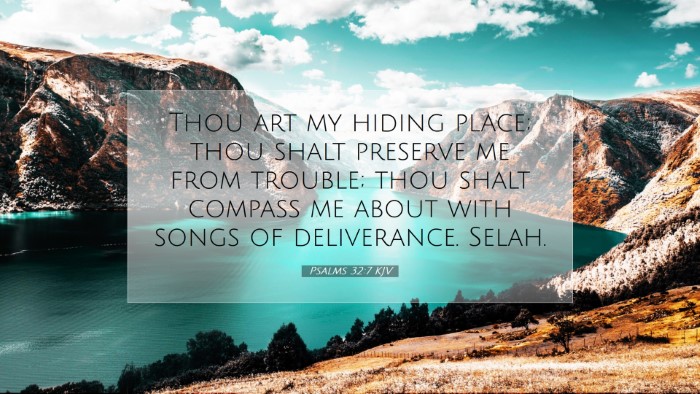Psalms 32:7 Commentary
Verse: "You are my hiding place; you will protect me from trouble and surround me with songs of deliverance."
Introduction
The verse from Psalms 32:7 is profound in its declaration of God's protective nature and the intimate relationship between the believer and God. It serves as a reassurance of God's sanctuary amidst life's struggles and sins. Through the works of notable commentators such as Matthew Henry, Albert Barnes, and Adam Clarke, we can delve deeper into its theological significance and practical application to contemporary faith.
Matthew Henry’s Commentary
Matthew Henry emphasizes the dual aspects of being a "hiding place" for the believer. He elucidates how God provides refuge and security during distress. Henry posits that this divine protection is both present and temporal, offering immediate peace to the troubled soul.
- Hiding Place: Henry interprets the "hiding place" as a metaphor for God’s promises and presence where believers can retreat when faced with adversity.
- Protection: The assurance of protection from troubles reflects God's active role in the lives of the faithful, guarding them against both external and internal threats.
- Songs of Deliverance: The "songs" signify joy and victory that follow God's deliverance, suggesting that the experience of divine rescue leads to an overflow of worship and gratitude.
Albert Barnes’ Insights
Albert Barnes draws attention to the emotional and spiritual states associated with God being our hiding place. He notes that this verse is a reflection of the believer’s trust in God’s ability to provide solace and emotional security.
- Trust in God: Barnes interprets the hiding place as a testament of faith—an indicator of where believers can turn when they are burdened by sin or trouble.
- Surrounding Protection: The imagery of being surrounded denotes an all-encompassing protection, emphasizing that God’s care is omnipresent and unwavering.
- Joyful Celebrations: The songs of deliverance further reflect the communal experience of salvation, where the faithful are invited to partake in collective praise and celebration of God’s redemptive acts.
Adam Clarke’s Exposition
Adam Clarke provides a detailed linguistic and theological analysis that enriches our understanding of this verse. He explores the Hebrew nuances that underscore God’s characteristics as a refuge for humanity.
- Hebrew Context: Clarke discusses the original Hebrew words, noting the connotations of safety and secrecy inherent in being a "hiding place," which emphasizes God's desire to protect His followers.
- Role of Repentance: He correlates the understanding of divine protection with themes of repentance, indicating that the believer's return to God invites His sheltering presence.
- Sound of Deliverance: Clarke emphasizes the importance of “songs” as an expression of personal and communal joy that arises from experiencing God's mercy and grace.
Theological Implications
The theological insights gleaned from these commentaries reveal a multi-faceted understanding of God's nature. Here are some critical takeaways:
- God as Refuge: The verse underscores the importance of viewing God not just as an overseer, but as a refuge where one can find solace in times of trouble.
- Protection from Trouble: This speaks to the actionable nature of God's presence; it is not merely spiritual but also practical, safeguarding believers from the trials of life.
- Community and Worship: The mention of songs emphasizes the vital aspect of community in the faith journey, encouraging shared experiences of joy and deliverance that emerge from God’s protection.
Practical Applications
In understanding Psalms 32:7, several practical applications arise for believers, theologians, and pastors:
- Encouragement in Trials: This verse serves as a reminder for individuals facing difficulties that they can find refuge in God’s presence.
- Fellowship and Praise: It encourages the faithful to gather together to share testimonies of God's deliverance, fostering a culture of worship and praise among believers.
- Teaching on Repentance: Pastors can expound upon God’s protective nature while teaching about the importance of repentance, highlighting the connection between acknowledging one's sins and experiencing divine mercy.
Conclusion
Psalms 32:7 eloquently expresses the intimate relationship between the believer and God. Through the insights of Matthew Henry, Albert Barnes, and Adam Clarke, we understand that God serves as a hiding place, providing protection and encompassing our lives with songs of deliverance. This verse reassures believers of God's unwavering presence in times of trouble and the joy that follows divine intervention. It calls the faithful to recognize and celebrate God’s redeeming love, making it a cornerstone for spiritual growth and community worship.


